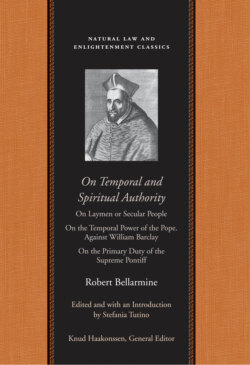Читать книгу On Temporal and Spiritual Authority - Robert Bellarmine - Страница 23
На сайте Литреса книга снята с продажи.
CHAPTER 9 The question of the authority of the magistrate is proposed
ОглавлениеThe third question follows: whether it is lawful for a Christian magistrate to establish law, administer justice, and punish the wicked. But there are two errors to refute. The first is that of the Waldensians and Anabaptists, who deny all this. Their arguments are that the obligation of the laws removes Christian freedom and that lawsuits are forbidden, in Matthew 5: “And if any man will sue thee at the law, and take away thy coat, let him have thy cloak also,”80 and in 1 Corinthians 6: “Now therefore there is utterly a fault among you, because ye go to law one with another. Why do ye not rather take wrong? why do ye not rather suffer yourselves to be defrauded?”81 Finally, capital punishment seems to be forbidden for Christians: Matthew 5, “Ye have heard that it hath been said, An eye for an eye, and a tooth for a tooth: But I say unto you, That ye resist not evil, etc.”82 Moreover it is clear that in the Old Testament inflicting the poena talionis was not permitted except to the magistrate, and therefore Christ prohibits precisely this when he says in Matthew 26: “All they that take the sword shall perish with the sword.”83
The second error is Calvin’s. Although in book 4 of the Institutiones, chapter 20, he proves, against the Anabaptists, that in the Church there must be civil laws, tribunals, and capital punishment, he nevertheless in book 4 of the Institutiones, chapter 10, section 5, affirms that the civil laws do not bind in conscience, something that was taught before him by Jean Gerson in De vita spirituali, lecture 4, and by Jacques Almain, in De potestate ecclesiastica, question 1, chapter 10. These are their reasons.
First, since political authority is temporal, it has nothing to do with conscience. Second, the end of the civil laws is external peace. Third, the prince does not judge in internal matters. Fourth, since the prince cannot inflict a spiritual punishment, he cannot make subjects liable to such punishment. Fifth, the prince cannot absolve, nor can he bind. Sixth, the sin would be punished twice, once here and once in the next world. Seventh, the prince for the most part does not intend to impose an obligation under pain of sin. Eighth, we should rather violate the most pressing civil law than the least divine law, such as that of not telling an officious lie. But since the latter binds only under pain of a venial sin, consequently the former does not bind at all, for if it bound under pain of sin, and especially mortal sin, it would be necessary to avoid a mortal sin rather than a venial sin.
